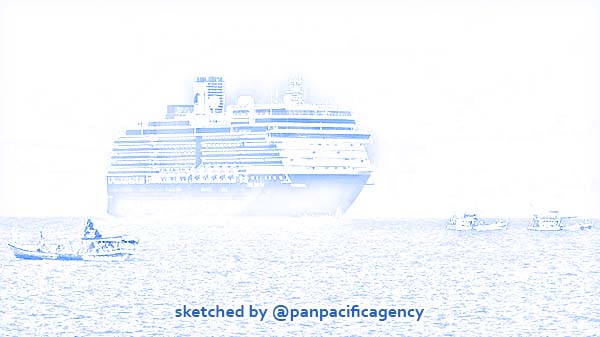Malaysia bars entry of MS Westerdam cruise passengers after American tests positive for virus

The Westerdam cruise ship is seen past fishing boats as it approaches port in Sihanoukville, Cambodia's southern coast on Feb 13, 2020. (Photo: AFP/Tand Chhin Sothy). Sketched by the Pan Pacific Agency.
KUALA LUMPUR, Feb 18, 2020, CNBC. Malaysia has barred the entry of remaining passengers from a cruise ship docked in Cambodia — after an American passenger tested positive for the new coronavirus upon her arrival in Kuala Lumpur, CNBC reported.
Confirming local media reports, Malaysia’s deputy minister for international trade and industry, Ong Kian Ming, told CNBC on Monday that his country will stop “other people who want to come to Malaysia from the cruise ship … for now.”
The 83-year-old American woman, who arrived in Malaysia from Cambodia last week, was the first person from the MS Westerdam cruise ship to test positive for the virus, now called COVID-19.
She and her husband were found to have flu-like symptoms while going through the thermal scanner at the Kuala Lumpur International Airport last week, local media reported. Her husband tested negative for the virus, the reports said.
The cruise — which carried 1,455 guests and 802 crew — departed Hong Kong on Feb. 1. The ship arrived in Cambodia last Thursday after being turned away by several countries including Japan, the Philippines, and Thailand, which were afraid passengers on board might be infected.
Malaysia is also closing its ports to cruise ships originating from or had transited in China, according to local media reports. The country has confirmed 22 cases of COVID-19, according to data from the Johns Hopkins University.
Speaking to CNBC’s “Squawk Box Asia,” Ong said the spread of the coronavirus would drag down Malaysia’s growth.
“Definitely, we’re anticipating that there will be short-term disruptions in the supply chains that could affect some of the multinational companies working and operating in Malaysia,” he said.
He added that the country’s growth could be lower than the government’s target of 4.8% for 2020. But both the government and the central bank, Bank Negara, have the ability to support the Malaysian economy, said Ong.
Still, various banks and research houses have downgraded their growth forecasts for Malaysia after the economy expanded by 3.6% year-on-year in the fourth quarter of 2019 — the slowest rate in a decade.
One of the most drastic downgrades came from Dutch bank ING, which cut its forecast for Malaysia’s 2020 growth from 4.5% to 3.5%.
“It’s not going to be too long before demand takes a hit from the rapid spread of Covid-19, the virus currently causing havoc worldwide,” Prakash Sakpal, Asia economist at ING, wrote in a note last week.